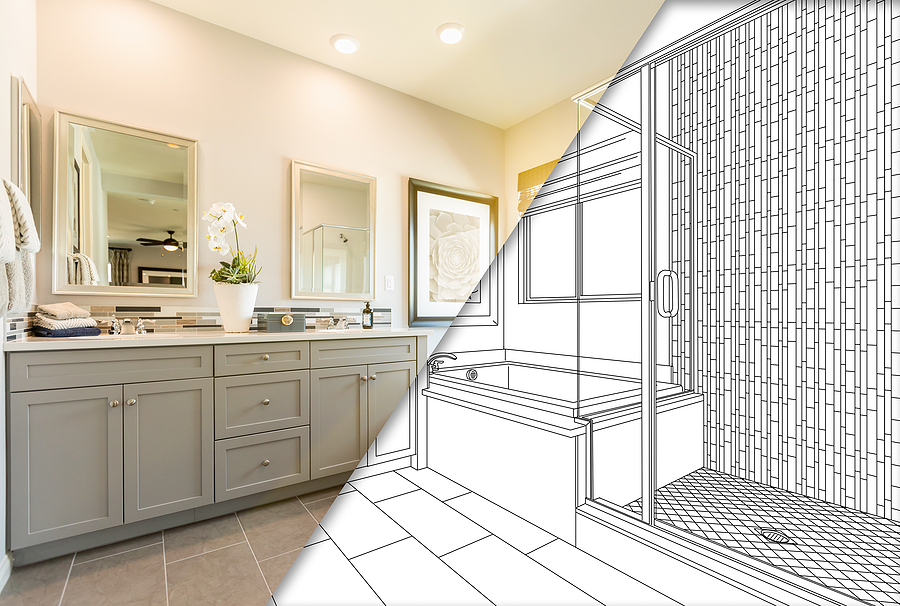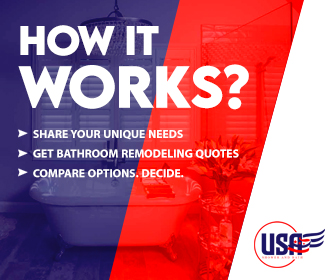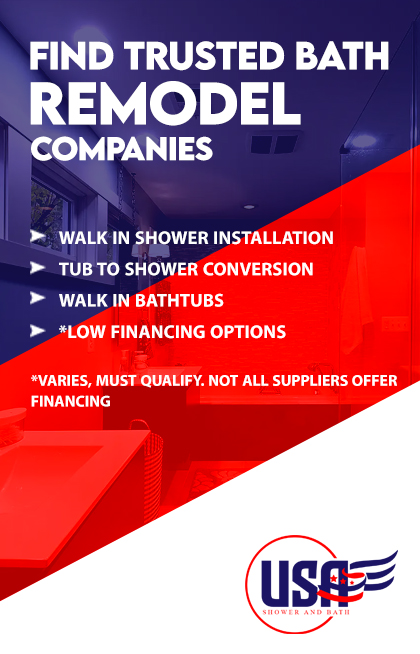
The Costs Involved in a Shower Installation
Renovating your bathroom or building one from scratch is an exciting venture. One of the critical aspects to consider is the shower installation, which can vary significantly in cost depending on various factors such as the type of shower, materials used, labor costs, and other extras. In this blog, we will delve into the different costs involved in a shower installation and give you a comprehensive breakdown.
Types of Showers and Their Costs
Different types of showers come with different price tags, which largely depend on the features they offer.
Standard Showers
A standard shower setup, which consists of a showerhead, a temperature control valve, and a tub spout, usually costs between $200 to $400. This doesn’t include the cost of tiles and other shower enclosure materials.
Rain Showers
A rain shower, known for its larger head and “rainfall” effect, can range from $250 to $500 or more, depending on the brand and model.
Handheld Showers
Handheld showers that come with a flexible hose for easy movement can cost anywhere between $100 to $300, again, dependent on the brand.

Shower Enclosure Costs
Apart from the shower fixtures, you’ll also need to consider the cost of the shower enclosure.
Shower Doors
The cost of shower doors can range from $100 to $600, depending on the type. Frameless shower doors tend to be more expensive than framed ones.
Shower Tiles
The cost for tiling a shower can vary greatly, depending on the type of tile chosen. It can range from $1 per square foot for ceramic tile to $50 per square foot for high-end materials like marble.
Labor Costs for Shower Installation
The cost of labor is a significant part of the total cost of shower installation. On average, plumbers charge between $50 to $150 per hour. The time it takes to install a shower can vary, but it typically takes about 8-10 hours for a straightforward installation. Therefore, you can expect to pay between $400 to $1500 for labor alone.
Extra Costs to Consider
Additional costs could arise from changes to the plumbing, especially if you’re switching from a bathtub to a shower. You may also incur costs for a shower pan installation and shower valve replacement. Depending on the age of your home and the existing bathroom structure, structural changes may be necessary, leading to additional costs.
Total Costs for Shower Installation
Taking into account the costs for the shower, the enclosure, labor, and extras, the total cost for a shower installation can range from $1,200 to $5,000 or more for luxury installations. It’s crucial to consider all these costs when planning for a shower installation to ensure you stay within your budget.
The shower installation cost can vary widely depending on the complexity of the project and the materials chosen. Always ensure to get a full estimate from your contractor before beginning work, and remember that while you might be tempted to cut costs in the short term, investing in quality materials and professional installation can save you money in the long run by avoiding costly repairs.

Costs of Popular Shower Materials
When it comes to the aesthetics and functionality of your shower, the choice of materials is critical. Here’s a brief rundown of some popular shower materials and their associated costs.
Ceramic and Porcelain Tiles
Ceramic and porcelain tiles are popular choices due to their durability and wide range of design options. They’re also relatively easy to clean. On average, ceramic tiles cost between $1 to $2 per square foot, while porcelain tiles range from $2 to $3 per square foot. However, designer tiles can cost up to $20 per square foot or more.
Natural Stone Tiles
Natural stone tiles like marble, granite, or slate can add a luxurious feel to your shower. However, they require more maintenance to prevent staining and damage. The cost of natural stone tiles can vary significantly, typically ranging from $10 to $50 per square foot.
Acrylic Shower Surrounds
Acrylic shower surrounds are a cost-effective option for those looking for a budget-friendly solution. They’re easy to install and maintain and can mimic the look of more expensive materials. Acrylic surrounds typically cost between $100 to $1,000, depending on the size and style.
Glass Shower Doors
Glass shower doors can create an open, airy feel in your bathroom. The cost of glass shower doors can vary widely, depending on the thickness and type of the glass and the complexity of the installation. On average, you can expect to pay between $600 to $1,300 for glass shower doors.
Fiberglass Shower Stalls
Fiberglass shower stalls are an affordable, all-in-one option that can be quickly and easily installed. They come in a range of sizes and styles, with prices ranging from $300 to $1,000.
Solid Surface Materials
Solid surface materials like Corian offer a seamless look and are available in a wide array of colors and patterns. They’re durable, easy to clean, and resistant to mold and mildew. Solid surface materials can range from $50 to $75 per square foot, including installation.
The choice of shower materials can greatly impact the overall cost and appearance of your shower. Therefore, it’s important to consider your budget, design preferences, and maintenance requirements before making your selection.

Signs It’s Time to Replace Your Current Shower
Identifying when it’s time to replace your shower can save you time, money, and potential discomfort down the line. Here are some signs that your shower may need a replacement:
- Constant Leaks: If your shower head or faucet consistently leaks, even after you’ve tried to repair it, it may be time for a replacement. Continuous leaks can increase your water bill and cause potential water damage to your bathroom.
- Mold and Mildew: Persistent mold and mildew that doesn’t disappear even after thorough cleaning can be a sign of more significant issues. They may indicate water seeping into areas it shouldn’t, potentially leading to structural damage.
- Cracks or Damage in the Shower Pan or Tiles: Visible cracks or damage in the shower pan or tiles can lead to leaks. Small cracks can expand over time, leading to significant water damage if not addressed.
- Outdated Design: If your shower’s design feels outdated or doesn’t align with your aesthetic preferences, it might be time for an upgrade. A new shower can enhance the overall look of your bathroom.
- Difficulty in Use or Cleaning: If your shower has become difficult to clean or use – for example, the doors don’t slide properly, or there’s persistent staining on the shower floor – a replacement might be in order.
- Reduced Water Pressure: If you’ve noticed a drop in your shower’s water pressure that isn’t related to your home’s overall water supply, your showerhead or internal shower plumbing might need replacing.
- Constant Repairs: If you find yourself consistently repairing different parts of your shower, it might be more cost-effective in the long run to replace it entirely.
By recognizing these signs early, you can plan for a shower replacement before it becomes a necessity. This way, you can budget appropriately and take the time to find the best shower option for your needs.

Shower Installation Options: From Custom Showers to Shower Surrounds
Depending on the size and layout of your bathroom, as well as your design preferences and budget, there are several shower installation options available.
- Custom Showers: For homeowners looking for a unique, tailored solution, custom showers offer the perfect fit. They are designed specifically for your space, ensuring they integrate seamlessly with the rest of the bathroom. This option is particularly useful in older homes, where standard showers might not fit properly, or in a small bathroom, where every inch counts. While they may fall on the higher end of the price range, custom showers can dramatically increase the value and appeal of your bathroom.
- Wet Rooms: A wet room is an open, waterproof shower area, often paired with a freestanding tub. This option can make your bathroom feel larger and more luxurious, although it does require careful installation to ensure water doesn’t escape to other areas of the bathroom.
- Shower Surrounds: A shower surround is a watertight, wall-mounted panel system that replaces the need for tiles. The most common materials for shower surrounds are acrylic and fiberglass, both known for their durability and ease of cleaning. Some models also include built-in shelving for convenience.
- Shower Liners: These are cost-effective solutions for improving the look of your shower without a full remodel. Shower liners are custom-fitted acrylic or PVC inserts that can be installed over your existing shower or tub, giving it a fresh, new appearance.
- Accessibility Features: For those with mobility challenges, shower installations can incorporate features such as grab bars, bench seating, or low-threshold entry for safety and ease of use.
Before choosing a shower installation option, it’s a good idea to consult with a professional to understand what will work best in your space and fit within your budget. From there, you can start to explore different styles, materials, and features to create your ideal shower experience.
Smart Ways to Save on Your Shower Installation
Planning a shower installation can be exciting but also potentially expensive. However, with a little savvy planning and some cost-effective strategies, you can save money on your shower installation while still achieving a stylish and functional result. Here are some top tips:
- Plan Thoroughly: A solid plan at the outset can save you from costly changes or mistakes down the line. Define your needs, budget, and preferred style before starting the project to avoid unnecessary expenses.
- Choose Cost-Effective Materials: While natural stone and high-end tile can look beautiful, they also come with a higher price tag. Consider more affordable alternatives like ceramic or porcelain tiles, which can offer similar aesthetic appeal at a fraction of the cost.
- Reuse When Possible: If parts of your current shower are still in good shape, consider whether they could be incorporated into the new design. For example, if your showerhead is still in good condition, reusing it could save you from purchasing a new one.
- DIY Where You Can: Some aspects of shower installation might be achievable on your own if you have the skills, like tiling or installing the showerhead. However, keep in mind that tasks involving plumbing should be left to professionals.
- Shop Around: Get quotes from multiple contractors and compare prices for materials from different sources. This not only helps to ensure that you’re getting the best deal, but it could also give you some negotiating power.
- Simplicity Saves: A simpler design will typically be less expensive. For instance, a shower stall without lots of niches and corners is easier (and thus cheaper) to tile than one with many angles and details.
- Avoid Moving Plumbing: If possible, keep the new shower in the same location as the old one to avoid the cost of rerouting plumbing.
- Invest in Quality Where it Counts: It’s wise to invest in high-quality fixtures and materials that see a lot of use. A slightly more expensive, well-made shower valve, for instance, will likely hold up better over time than a cheaper model, potentially saving you money on replacements or repairs in the future.
Remember, while saving money is important, it should never come at the expense of quality and safety. Always ensure any changes or installations comply with local building codes and standards.

Evaluating Your Shower Installation Options: Shower Curtain, Tub, or Full Replacement?
When planning a bathroom renovation or shower installation, it can be challenging to determine which route to take. Will a simple shower curtain suffice? Should you consider upgrading your existing bathtub? Or is a full shower replacement the best option? Here, we will discuss these alternatives and provide some important questions to guide your decision-making process.
Shower Curtain: A Quick and Affordable Solution
Opting for a shower curtain is a great option for those on a tight budget or looking for a quick and simple solution. Shower curtains come in an array of designs and materials, offering flexibility in terms of aesthetics. They are easy to install and replace, making them a convenient choice for renters or those planning to upgrade to a full shower enclosure in the future.
However, it’s important to remember that shower curtains don’t provide the same level of water containment as a glass enclosure or shower door, so they may not be suitable for high-pressure showers or wet rooms. They also require regular cleaning to prevent mildew buildup.
Enhancing Your Existing Bathtub
If you have an existing bathtub that’s in good condition, enhancing it with a new showerhead, curtain, or glass screen could be an excellent intermediate step. This could also include adding a tiled surround for a more polished look, installing grab bars for safety, or upgrading the faucets and fixtures for a more modern aesthetic.
Again, you’ll need to consider the practicality of this option based on your bathroom layout, the condition of your tub, and your bathing preferences. If you’re a fan of relaxing soaks, keeping the tub might be the best option. However, if space is limited, a full shower enclosure could free up valuable square footage.
Full Shower Replacement: The Complete Makeover
If your budget allows, a full shower replacement can deliver a comprehensive solution tailored to your specific needs and preferences. The shower replacement costs vary greatly, depending on factors such as the size of the shower, the materials used, and the complexity of the installation.
Before committing to a full replacement, ask yourself the following important questions:
- What is the current condition of your shower or bathtub?
- How often do you use your shower, and what are your personal preferences for bathing?
- What is your budget for the renovation?
- Are there any accessibility concerns that could be addressed with a walk-in shower?
- How long do you plan to stay in your home? If you’re planning to sell soon, consider what potential buyers might prefer.
Keep in mind that while a full shower replacement might have a higher upfront cost, it can add significant value to your home and enhance your daily bathing experience. It’s also an opportunity to rectify any existing issues such as leaks or water damage, which can save on repair costs in the long run. Each of these options has its benefits and considerations. By evaluating your specific needs, preferences, and budget, you’ll be able to determine the best option for your bathroom upgrade.

DIY vs. Professional Installation: Weighing Your Options
After you’ve decided on the type of shower installation you want, the next important consideration is whether to take the do-it-yourself route or hire a professional. This decision can significantly impact your project’s timeline, cost, and final result.
DIY Shower Installation
For those with experience in home renovation, installing a new shower can be an exciting challenge. Taking the DIY route can certainly save on labor costs and offer the satisfaction of completing a project with your own hands. This approach allows you to work at your own pace and can give you greater control over the entire process.
However, it’s important to consider the complexity of a shower installation. It often involves detailed tile work, plumbing adjustments, and ensuring a watertight seal. A simple mistake can lead to substantial issues down the line, such as water leaks and damage. Therefore, unless you have the right skills and experience, a DIY shower installation may not be the best choice.
Hiring a Professional
While hiring a professional involves an additional cost, the benefits can often outweigh the expenditure. A professional bathroom contractor has the necessary experience and skills to ensure that the installation is done correctly and efficiently. They will be able to handle any unexpected issues that may arise during the process, and their work should come with a warranty, offering you peace of mind.
A professional can also offer advice on the best materials and design choices for your specific bathroom layout and personal preferences. They will take care of the heavy lifting, plumbing, waterproofing, and cleanup, making the renovation process smoother and less stressful for you.
Whether you decide on a shower curtain, a tub enhancement, or a full shower replacement, remember to consider both your immediate needs and long-term satisfaction. Also, consider whether a DIY approach or hiring a professional is the right choice for your shower installation.
In either case, transforming your bathroom should be an exciting venture. With the right planning, budgeting, and execution, you’ll have a beautiful new shower to enjoy for many years to come.

Expanding Your Options: From Small Showers to Custom Units
Whether you’re working with limited space or have a roomy bathroom, understanding your shower options is crucial for a satisfying and successful installation. Let’s delve into some of the most popular options, from compact units to luxurious custom showers.
Small Showers
For bathrooms with a smaller footprint, there are still plenty of stylish and functional shower options. Corner showers, for example, are a great way to maximize space. Despite their compact size, they can still offer a comfortable bathing experience. For even more functionality, consider a shower-tub combination, which allows for both a quick rinse and a relaxing soak.
Walk-In Shower Costs
Walk-in showers have become increasingly popular due to their sleek, modern design and accessibility. They eliminate the need for a step or ledge, making them a great option for those with mobility issues. The cost of a walk-in shower can vary greatly depending on the size, materials used, and whether it’s a prefabricated unit or custom-built. On average, the cost for a new walk-in shower installation can range from $1,200 to $5,000.

Shower-Tub Combination
If you can’t decide between a shower and a tub, why not have both? A shower-tub combination offers the best of both worlds. It’s an especially good idea when replacing an old tub, as the plumbing is already set up for this type of fixture. It also adds value to your home, as many prospective homebuyers appreciate having both options available.
Standard Shower Sizes
Understanding standard shower sizes can help when planning your renovation. The minimum size for a shower is 32 x 32 inches for a stand-up shower. However, if you’re looking to add seating or want a bit more elbow room, you might consider sizing up to 36 x 48 inches or larger.
Custom Units
For homeowners seeking a truly unique look or specific features, a custom unit may be the best option. These showers are built from scratch to fit your exact specifications, allowing for a wide range of shapes, sizes, and materials. Whether you want a double shower, a steam shower, or a specific tile design, the only limit is your imagination. However, keep in mind that a custom shower will typically be more expensive than a standard or prefabricated unit.
Your new shower installation should be an exciting opportunity to create a space that suits your needs and aesthetic preferences. From small showers to walk-in showers, shower-tub combinations, or custom units, the possibilities are virtually endless. The key is to carefully plan, consider your options, and choose the one that will provide the most satisfaction for your investment.
